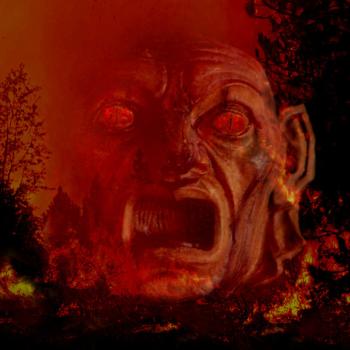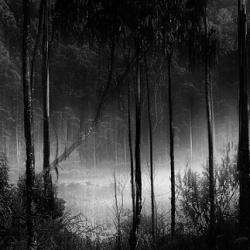
[From my book, Quotable Catholic Mystics and Contemplatives (April 2014, 304p), pp. 145-151. Follow the link for book and purchase information]
[I]n Hell, the souls have four principal torments, out of which proceed all the other torments. The first is, that they see themselves deprived of the vision of Me, which is such pain to them, that, were it possible, they would rather choose the fire, and the tortures and torments, and to see Me, than to be without the torments and not to see Me. This first pain revives in them, then, the second, the worm of Conscience, which gnaws unceasingly, seeing that the soul is deprived of Me, and of the conversation of the angels, through her sin, made worthy of the conversation and sight of the devils, which vision of the Devil is the third pain and redoubles to them their every toil. As the saints exult in the sight of Me, refreshing themselves with joyousness in the fruit of their toils borne for Me with such abundance of love, and displeasure of themselves, so does the sight of the Devil revive these wretched ones to torments, because in seeing him they know themselves more, that is to say, they know that, by their own sin, they have made themselves worthy of him. And so the worm of Conscience gnaws more and more, and the fire of this Conscience never ceases to burn. And the sight is more painful to them, because they see him in his own form, which is so horrible that the heart of man could not imagine it. . . . by Divine justice, he appears more horrible to the soul that is deprived of Me, and more or less according to the gravity of her sin. The fourth torment that they have is the fire. This fire burns and does not consume, for the being of the soul cannot be consumed, because it is not a material thing that fire can consume. But I, by Divine justice, have permitted the fire to burn them with torments, so that it torments them, without consuming them, with the greatest pains in diverse ways according to the diversity of their sins, to some more, and to some less, according to the gravity of their fault. Out of these four torments issue all others, such as cold and heat and gnashing of the teeth and many others. Now because they did not amend themselves after the first reproof that they had of injustice and false judgment, neither in the second, which was that, in death, they would not hope in Me, nor grieve for the offense done to Me, but only for their own pain, have they thus so miserably received Eternal Punishment. (St. Catherine of Siena, The Dialogue, “A Treatise of Discretion”)
And their hatred is so great that they cannot will or desire any good, but they continually blaspheme Me. And do you know why they cannot desire good? Because the life of man ended, free-will is bound. Wherefore they cannot merit, having lost, as they have, the time to do so. If they finish their life, dying in hatred with the guilt of mortal sin, their souls, by divine justice, remain forever bound with the bonds of hatred, and forever obstinate in that evil, in which, therefore, being gnawed by themselves, their pains always increase, especially the pains of those who have been the cause of damnation to others, . . . (St. Catherine of Siena, The Dialogue, “A Treatise of Discretion”)
I have told you of the dignity of the Righteous, so that you may the better know the misery of the damned. For this is another of their pains, namely, the vision of the bliss of the righteous, which is to them an increase of pain, as, to the righteous, the damnation of the damned is an increase of exultation in My goodness. As light is seen better near darkness, and darkness near light, so the sight of the Blessed increases their pain. With pain they await the Last Day of Judgment, because they see, following it, an increase of pain to themselves. And so will it be, because when that terrible voice shall say to them, ‘Arise, you dead, and come to judgment,’ the soul will return with the body, in the just to be glorified, and in the damned to be tortured eternally. And the aspect of My Truth, and of all the blessed ones will reproach them greatly, and make them ashamed, and the worm of conscience will gnaw the pith of the tree, that is the soul, and also the bark outside, which is the body. They will be reproached by the Blood that was shed for them, and by the works of mercy, spiritual and temporal, which I did for them by means of My Son, and which they should have done for their neighbor, as is contained in the Holy Gospel. They will be reproved for their cruelty towards their neighbor, for their pride and self-love, for their filthiness and avarice; and when they see the mercy that they have received from Me, their reproof will seem to be intensified in harshness. At the time of death, the soul only is reproved, but, at the General Judgment, the soul is reproved together with the body, because the body has been the companion and instrument of the soul—to do good and evil according as the free-will pleased. Every work, good or bad, is done by means of the body. And, therefore, justly, My daughter, glory and infinite good are rendered to My elect ones with their glorified body, rewarding them for the toils they bore for Me, together with the soul. And to the perverse ones will be rendered eternal pains by means of their body, because their body was the instrument of evil. Wherefore, being their body, restored, their pains will revive and increase at the aspect of My Son, their miserable sensuality with its filthiness, in the vision of their nature (that is, the humanity of Christ), united with the purity of My Deity, and of this mass of their Adam nature raised above all the choirs of Angels, and themselves, by their own fault, sunk into the depths of Hell. And they will see generosity and mercy shining in the blessed ones, who receive the fruit of the Blood of the Lamb, the pains that they have borne remaining as ornaments on their bodies, like the dye upon the cloth, not by virtue of the body but only out of the fullness of the soul, representing in the body the fruit of its labor, because it was the companion of the soul in the working of virtue. As in the mirror is represented the face of the man, so in the body is represented the fruit of bodily toils, in the way that I have told you. The pain and confusion of the darkened ones, on seeing so great a dignity (of which they are deprived), will increase, and their bodies will appear the sign of the wickedness they have committed, with pain and torture. And when they hear that terrible speech, ’Go, cursed ones, to the Eternal Fire,’ the soul and the body will go to be with the Devil without any remedy or hope—each one being wrapped up in diverse filth of earth, according to his evil works. The miser with the filth of avarice, wrapping himself up with the worldly substance which he loved disordinately, and the burning in the fire; the cruel one with cruelty; the foul man with foulness and miserable concupiscence; the unjust with his injustice; the envious with envy; and the hater of his neighbor with hatred. And inordinate self-love, whence were born all their ills, will be burnt with intolerable pain, as the head and principle of every evil, in company with pride. So that body and soul together will be punished in diverse ways. Thus miserably do they arrive at their end who go by the lower way, that is, by the river, not turning back to see their sins and My Mercy. And they arrive at the Gate of the Lie, because they follow the doctrine of the Devil, who is the Father of Lies; and this Devil is their Door, through which they go to Eternal Damnation, . . . (St. Catherine of Siena, The Dialogue, “A Treatise of Discretion”)
It hath been said, that there is of nothing so much in hell as of self-will. The which is true, for there is nothing else there than self-will, and if there were no self-will, there would be no Devil and no hell. . . . therefore there is all manner of misery and wretchedness. So is it also here on earth. (Theologia Germanica, ch. 49, 51)
*
[A] man will be more grievously punished in the things in which he has sinned. There the lazy will be driven with burning prongs, and gluttons tormented with unspeakable hunger and thirst; the wanton and lust-loving will be bathed in burning pitch and foul brimstone; the envious will howl in their grief like mad dogs. Every vice will have its own proper punishment. The proud will be faced with every confusion and the avaricious pinched with the most abject want. One hour of suffering there will be more bitter than a hundred years of the most severe penance here. In this life men sometimes rest from work and enjoy the comfort of friends, but the damned have no rest or consolation. You must, therefore, take care and repent of your sins now so that on the day of judgment you may rest secure with the blessed. . . . Learn, then, to suffer little things now that you may not have to suffer greater ones in eternity. (Thomas à Kempis, The Imitation of Christ, Bk. I, ch. 24)
The condemned in hell are in the order of God through justice. Could they be outside of it they would be in a still greater hell by their violation of the divine order, which gives them the terrible instinct to go directly to their appointed place. Elsewhere their sufferings would be redoubled, and therefore they go thither, not indeed that they may suffer less, but impelled by that supreme and infallible decree of God, which cannot err. (St. Catherine of Genoa, Spiritual Dialogue, Pt. III, ch. 13)
[I]t is guilt which is the cause of the malignant will of the condemned in hell, to whom God does not communicate his goodness, and thus they remain in despair and with a will forever opposed to the good will of God. (St. Catherine of Genoa, Treatise on Purgatory, ch. 3)
As the purified spirit finds no repose but in God, for whom it was created, so the soul in sin can rest nowhere but in hell, which by, reason of its sins, has become its end. Therefore, at that instant in which the soul separates from the body, it goes to its prescribed place, needing no other guide than the nature of the sin itself, if the soul has parted from the body in mortal sin. (St. Catherine of Genoa, Treatise on Purgatory, ch. 7)
I was one day in prayer when I found myself in a moment, without knowing how, plunged apparently into hell. I understood that it was our Lord’s will I should see the place which the devils kept in readiness for me, and which I had deserved by my sins. It was but a moment, but it seems to me impossible I should ever forget it even if I were to live many years. The entrance seemed to be by a long narrow pass, like a furnace, very low, dark, and close. The ground seemed to be saturated with water, mere mud, exceedingly foul, sending forth pestilential odours, and covered with loathsome vermin. At the end was a hollow place in the wall, like a closet, and in that I saw myself confined. All this was even pleasant to behold in comparison with what I felt there. There is no exaggeration in what I am saying. But as to what I then felt, I do not know where to begin, if I were to describe it; it is utterly inexplicable. I felt a fire in my soul. I cannot see how it is possible to describe it. My bodily sufferings were unendurable. I have undergone most painful sufferings in this life, . . . yet all these were as nothing in comparison with what I felt then, especially when I saw that there would be no intermission, nor any end to them. These sufferings were nothing in comparison with the anguish of my soul, a sense of oppression, of stifling, and of pain so keen, accompanied by so hopeless and cruel an infliction, that I know not how to speak of it. If I said that the soul is continually being torn from the body, it would be nothing, for that implies the destruction of life by the hands of another but here it is the soul itself that is tearing itself in pieces. I cannot describe that inward fire or that despair, surpassing all torments and all pain. I did not see who it was that tormented me, but I felt myself on fire, and torn to pieces, as it seemed to me; and, I repeat it, this inward fire and despair are the greatest torments of all. Left in that pestilential place, and utterly without the power to hope for comfort, I could neither sit nor lie down: there was no room. I was placed as it were in a hole in the wall; and those walls, terrible to look on of themselves, hemmed me in on every side. I could not breathe. There was no light, but all was thick darkness. I do not understand how it is; though there was no light, yet everything that can give pain by being seen was visible. . . . our Lord made me really feel those torments, and that anguish of spirit, just as if I had been suffering them in the body there. . . . all burning here in this life is as nothing in comparison with the fire that is there. . . . Ever since that time, as I was saying, everything seems endurable in comparison with one instant of suffering such as those I had then to bear in hell. (St. Teresa of Ávila, Autobiography, ch. 32)
Let us remember, sisters, how those who are in hell lack this submission to the divine will and the resignation and consolation God gives such a soul and the solace of knowing that their pains benefit them, for the damned will continually suffer more and more; (more and more, I mean in regard to accidental pains). . . . the lost . . . know that their anguish will last for ever: what, then, will become of these miserable souls? What can we do or suffer during our short lives which is worth reckoning if it will free us from such terrible and endless torments? (St. Teresa of Ávila, The Interior Castle, Pt. VI, ch. 11)
***
Photo credit: Demon (Horror Fantasy), by Maxwell Hamilton (3-3-14) [Flickr / CC BY 2.0 license]
***













